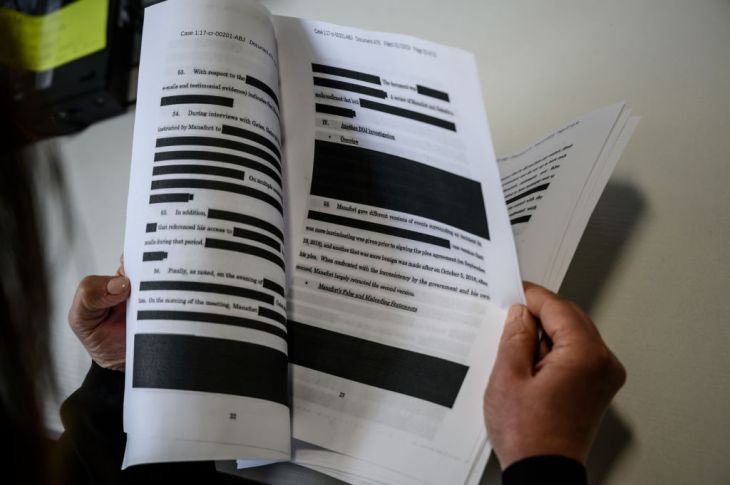Though
heavily blacked out, report presents a damning picture
By
 Attorney General William Barr delivered a redacted version of
the Mueller report to Congress and posted the special counsel's findings online
Thursday morning.
Attorney General William Barr delivered a redacted version of
the Mueller report to Congress and posted the special counsel's findings online
Thursday morning.
The document's publication
followed a Justice Department press conference that critics and Democratic lawmakers denounced
as an effort to spin Mueller's findings and protect President Donald Trump.
"Before the American
people can read it themselves, Barr is trying to spin a report he knows will
damage his boss," tweeted Rep. Barbara Lee
during Barr's morning press conference. "Don't listen to Barr—read
Mueller's words yourself."
Though Democrats demanded
the full report, the findings delivered to Congress were redacted.
During his press conference, Barr insisted that none of the redactions were the result of "executive privilege."
During his press conference, Barr insisted that none of the redactions were the result of "executive privilege."
Click here to read
Mueller's report (pdf).
According to the New York Times, Justice Department officials had "numerous conversations" with White House officials ahead of the Mueller report's release.
According to the New York Times, Justice Department officials had "numerous conversations" with White House officials ahead of the Mueller report's release.
Karen Hobert Flynn, president of government watchdog group Common Cause, said in a statement that "Congress must be given the full report and Congress must determine what needs to be redacted."
"Those determinations
should not be made by a Trump apologist like William Barr who openly criticized
the Mueller investigation prior to his appointment as Attorney General,"
Flynn added.
As the Washington Post reports, Mueller's findings paint
"a far less flattering picture for Trump than the attorney general has
offered" on the question of whether the Trump campaign coordinated with
Russian government officials.
"Although the
investigation established that the Russian government perceived it would
benefit from a Trump presidency and worked to secure that outcome, and that the
campaign expected it would benefit electorally from information stolen and
released through Russian efforts," Mueller's team wrote, "the
investigation did not establish that members of the Trump campaign conspired or
coordinated with the Russian government in its election interference
activities."
"While the
investigation identified numerous links between individuals with ties to the
Russian government and individuals associated with the Trump campaign, the
evidence was not sufficient to support criminal charges," the report
reads.
Mueller's 400-page report
also examines 10 instances of possible obstruction of justice by the president.
While the special counsel does not reach "ultimate conclusions about the
president's conduct," his report explicitly does not exonerate Trump of
obstruction.
"[I]f we had
confidence after a thorough investigation of the facts that the president
clearly did not commit obstruction of justice, we would so state," the
report reads.
"Based on the facts and the applicable legal standards, we are unable to reach that judgment. Accordingly, while this report does not conclude that the president committed a crime, it also does not exonerate him."
"Based on the facts and the applicable legal standards, we are unable to reach that judgment. Accordingly, while this report does not conclude that the president committed a crime, it also does not exonerate him."
Mueller's report also highlights Trump's
reaction when he learned the special counsel was appointed.
"Oh my God,"
Trump said, according to the report. "This is terrible. This is the end of
my presidency. I'm f**ked."
Here is the section from the Mueller report on Trump's efforts to block the investigation. These efforts failed largely because Trump's own aides did not carry out his orders:

Here is the section from the Mueller report on Trump's efforts to block the investigation. These efforts failed largely because Trump's own aides did not carry out his orders:
